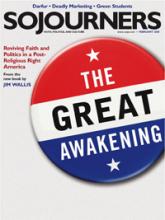In the Philippines, as in much of the global South, infant formula powder is a booming industry. Television ads for formula feature prodigy violinists and boast of “brain building blocks” and “IQ nutrition systems.” False advertising also leads mothers to believe that breast milk is inferior, and that their bodies will not produce enough milk to nourish a child.
Last September, more than a thousand breastfeeding mothers rallied in Quezon City. The Catholic Bishops Conference of the Philippines has been distributing booklets emphasizing that “breast milk is important because it is a unique gift from God which no one can replace.” Dr. Shigeru Omi, World Health Organization Director for the Western Pacific Region, said, “The church has a major role in advocacy to promote breastfeeding and will greatly influence society.”
Breastfeeding benefits infants with balanced age-specific nutrition and immunities that prevent infections. UNICEF estimates that 1.3 million children die per year because they are not exclusively breastfed for the first six months. Medical research shows that formula-fed babies can suffer poor nutrition and growth and decreased IQ, along with numerous life-long risks. Formula, which comes in a powder that must be mixed with water, is especially dangerous in areas with poor access to clean drinking water; infants’ weak immune systems are exposed to treacherous bacteria and viruses, starting a cycle of diarrhea and malnutrition.
Read the Full Article
